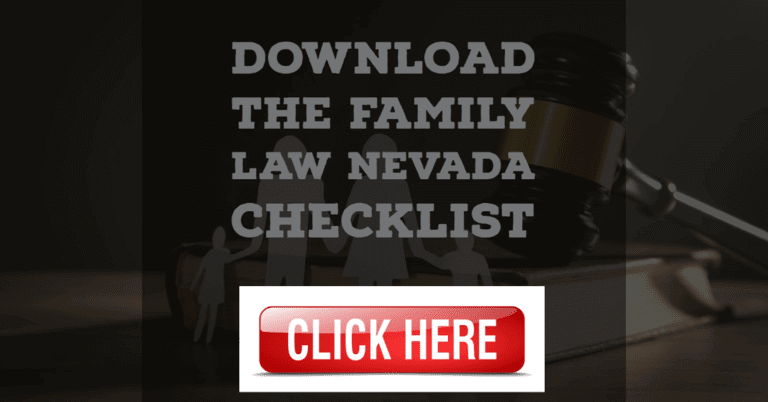Guardianship (Temporary v. Permanent)
Understanding the Different Types of Legal Guardianship in Nevada
Sometimes, it’s a loving grandparent stepping in when grandchildren are left parentless at the hands of an accident, incarceration, abuse, or abandonment.
Other times, an adult child watching their elderly parent fall deeper into dementia or mental illness wants to take on that caretaker role willingly.
In other words, guardianships aren’t all that unusual.
But what stumps many outside of the legal profession is the difference between the two main types of guardianships: temporary v. permanent.
Learn more about temporary and permanent guardianships in Nevada below.
What Are the Requirements To Be a Guardian?
Over 2.2 million Nevada residents meet the State’s guardian requirement: 18 years or older.
However, it’s not that simple.
In Nevada, there are a few deal-breakers that make a person ineligible for that legal guardianship role:
- Incompetency (i.e., you struggle to take care of yourself)
- A recent bankruptcy within the last seven years (unless you won’t be in charge of their estate or no other guardians are available)
- A felony record
- A disbarment as an attorney, accountant, or other licensed position
- History of domestic violence, neglect, abuse, abandonment, or exploitation
That guardian title also brings several duties and responsibilities along with it.
You’ll have to prove to a family court judge that you can keep the protected person well-fed, clothed, healthy, and sheltered.
It might also leave you in charge of their assets, estate, and medical care.
What Is Temporary Guardianship in Nevada?
If you patiently wait your turn for a family court hearing, you might be on pins and needles for a solid 2-3 months until you can talk to a judge.
But sometimes, there’s no time to waste.
That’s why, in Nevada, you can seek a temporary guardianship in cases of emergency that involve the following three criteria:
- An immediate and substantial risk for physical harm or financial turmoil
- Immediate medical attention
- Inability to respond to the risk for harm, financial loss, and medical attention
In the State of Nevada, the standard temporary guardianship lasts ten days.
However, if you can prove that the guardianship should continue, you can extend it for an additional 60 days.
You might be able to get an additional 60 days if you can show the judge there are extraordinary circumstances; however, before the expiration of the final 60 day extension, you should be considering a permanent legal guardianship if it does not appear the Protected Person is going to regain capacity.
Common Scenarios for Temporary Guardianship in Nevada
A temporary guardianship typically stems from an emergency situation.
For example, a child’s last remaining parent dying suddenly, a person suffering a severe brain injury in a car accident, or the current legal guardian exploiting the estate.
A judge may also grant a temporary guardianship over a minor child if their parents aren’t providing them child life-saving medical treatment.
Stepping in as a temporary guardian allows you to make decisions on the protected person’s behalf (if it’s a special guardianship, the other person may still have some say in their care).
What Is a Short-Term Temporary Guardianship?
Nevada also has something called a short-term temporary guardianship that offers two clear benefits: bypassing standard legal proceedings and allowing the guardianship to begin now.
Short-term Temporary Guardianships are typically valid for minor children only. They are often used if parents are traveling out of town for an extended period of time and leaving their child with another family member or when a parent cannot care for a child for a short period of time for other reasons.
This type of guardianship has a six-month time limit, automatically expiring exactly six months after all three parties sign the document:
- The parents (both parents must consent if they share legal custody of the minor child)
- The new guardian
- The child (assuming they’re 14 years or older)
If a single military parent is deploying, recovering in the hospital, or leaving the country for an extended period, you can execute a short-term temporary guardianship.
There’s also an option to extend the guardianship another six months or transition it to a permanent guardianship if needed.
What Is General Guardianship?
As the name implies, a general guardianship doesn’t have a rigid start and end date like a temporary one does; it lasts indefinitely.
These guardianships will come to an end (dissolve or terminate) if:
- One party passes away
- The child turns 18
- The parents regain their competency and can prove they’re now fit to care for the child again (note: you can fight to maintain guardianship)
- Both the guardian and protected person leave Nevada permanently
- The protected adult becomes competent again (note: this requires two physicians to agree and write letters backing these claims)
Terminating the permanent guardianship requires a great deal of paperwork (by either the protected person, their legal guardian, or someone else), serving papers, and a hearing.
When Would You Need a General Guardianship?
A general guardianship makes the most logical sense if the protected minor child or adult needs a long-term caretaker.
Some scenarios where general guardianships make sense include:
- If the child’s parents are abusive, addicted to drugs, in prison, or unfit to be parents
- When the protected person’s medical or mental condition is only worsening
- The current guardians can no longer care or provide for the person
Permanent guardianships are reversible, though it requires a lengthy court process.
Can You Transition From a Temporary to a General Guardianship?
In a way, yes.
You can petition for general guardianship over the protected party.
To file for general guardianship over a child, you’ll need to:
- File the guardianship papers, one per child (if the estate is <$2,500, there is no filing fee; otherwise, it’s a $0 fee).
- Serve the child’s relatives, the child (if 14 and older), and the Department of Health and Human Services with the Petition and the Citation.
- Attend a court hearing on the matter; if the judge doesn’t decide at the initial hearing, he or she may require a trial with expert and witness testimony.
- Fill out additional paperwork, such as the proof of blocked account (immediate).
To file for permanent guardianship over an adult, you’ll need to:
- Fill out the court-ordered paperwork and file them with the court (filing fees are $0 unless the estate is worth $2,500+).
- Serve the Petition and Citation to the protected adult’s relatives, the adult, and all required agencies (i.e., Medicaid or Veterans Affairs).
- Attend the court hearing and bring the Physician’s Certificate of Incapacity with you.
- Fill out additional paperwork, like the proof blocked account (due immediately).
Both processes require additional paperwork within the next 60 days and every year.
Navigating Guardianship Petitions Without Legal Assistance
You don’t need one, but it would certainly help.
With all the required paperwork, high emotions, and strict legal guidelines, petitioning for a permanent or temporary guardianship can be challenging for the layperson.
While having legal assistance can be helpful, it is possible to navigate the guardianship process on your own with the right resources and guidance.
We help in all the different types of guardianship in Nevada
Whether you’re the guardian, protected person, or a concerned family member, give us a call at (702) 433-2889 or complete our online contact form for more information.
Why You Haven’t Hired a Guardianship Attorney Yet
Watch this short video to take the next big step toward defending your rights in a guardianship case.
Further Reading
Our lead attorney, Molly Rosenblum Allen, Esq., has not only provided expert legal services but has also developed a suite of resources to assist those navigating the complexities of guardianship. These resources are designed to guide you through various aspects of guardianship law, offering clarity and support when you need it most. Here’s a brief overview of the valuable resources she has created:
Las Vegas Guardianship Attorney: A comprehensive guide for those seeking guardianship-related legal assistance in Las Vegas.
Legal Guardianship: An in-depth look at legal guardianship, outlining the process, responsibilities, and key considerations.
Guardianship Forms: Access to essential forms and documentation required for the guardianship process.
Guardianship of a Child in Las Vegas: Specific guidance on obtaining guardianship of a child in Las Vegas, covering legal requirements and procedural steps.
Adult Guardianship: Insights into the process of becoming a guardian for an adult, including the legal implications and duties involved.
Pros and Cons of Guardianship: An analysis of the advantages and disadvantages of guardianship, providing a balanced perspective for decision-making.
Dependency Cases: Expert insights into dependency cases, offering guidance for those dealing with this complex area of law.
Terminate Legal Guardianship: Information on the process and legal requirements for terminating a guardianship.
Parental Responsibility for Disabled Adults in Nevada: Guidance on managing parental responsibilities for disabled adults, focusing on Nevada’s specific laws and regulations.
Nevada Power of Attorney: A resource explaining the intricacies of power of attorney in Nevada, including how to obtain it and its implications.
Molly Rosenblum Allen, Esq. is dedicated to providing support and clarity during your guardianship journey. We encourage you to explore these resources to gain the knowledge and confidence needed to navigate your legal challenges.

Frequently Asked Questions
What are the different types of legal guardianship in Nevada?
Legal guardianships come in various forms, each with its own set of rules and responsibilities. Understanding these types is crucial for anyone considering guardianship in Nevada.
Who is eligible to be a guardian in Nevada?
While many Nevada residents meet the basic requirement of being 18 years or older, there are certain disqualifications that could prevent someone from becoming a guardian. Knowing these eligibility criteria is essential before pursuing guardianship.
What is temporary guardianship, and when is it necessary?
Temporary guardianship serves as a rapid solution in emergency situations, providing immediate protection for individuals facing imminent harm or financial instability. Knowing when and how to pursue temporary guardianship can make all the difference in critical moments.
What is a short-term temporary guardianship, and how does it differ from other types?
Short-term temporary guardianships offer unique benefits, such as expedited proceedings and flexibility in duration. Understanding the specifics of this arrangement is vital for those seeking temporary guardianship for minors.
What is general guardianship, and when is it appropriate?
General guardianship entails long-term care and decision-making for minors or incapacitated adults. Knowing when to pursue general guardianship and understanding the process is essential for ensuring the well-being of the protected individual.
Can temporary guardianship transition to general guardianship?
Transitioning from temporary to general guardianship is possible under certain circumstances. Understanding the process and requirements for this transition is crucial for individuals seeking extended guardianship arrangements.
Do I need an attorney to petition for guardianship?
While not mandatory, having legal representation can significantly streamline the guardianship process and ensure compliance with all legal requirements. Understanding the benefits of legal assistance can help individuals make informed decisions about their guardianship proceedings.
Where can I find additional resources and support for navigating guardianship in Nevada?
Navigating the complexities of guardianship can be challenging, but there are resources available to provide guidance and support. Exploring these resources, including guides, forms, and expert insights, can empower individuals to navigate their guardianship journey with confidence.

Offsite Resources You May Find Helpful
Here are seven offsite resources that provide information about temporary and permanent guardianship:
FindLaw: This online resource provides free legal information, a lawyer directory, and other resources on a wide range of legal topics, including temporary and permanent guardianship.
Justia: Justia offers free legal information and a directory of attorneys for various legal issues, including temporary and permanent guardianship.
American Bar Association: The ABA provides a variety of resources on legal topics, including information on temporary and permanent guardianship.
Nolo: Nolo provides legal information for consumers and small businesses, including articles, blogs, FAQs, and news on temporary and permanent guardianship.
Avvo: This website provides a directory of lawyers, legal advice, and other resources on a broad range of legal topics, including temporary and permanent guardianship.
LegalMatch: This online legal matching service helps individuals find lawyers in their area and provides advice and resources on family law matters, including temporary and permanent guardianship.
The National Guardianship Association: This organization provides educational, training, and networking opportunities for guardians and about guardianship. It’s a great resource for understanding both temporary and permanent guardianship.

What's Next?
Are you trying to find the perfect guardian attorney in Las Vegas?
Look no further!
The Rosenblum Allen Law Firm has got your back.
Our experienced lawyers have been helping people get a handle on their legal needs for over 10 years.
Plus, our office is conveniently located right here in sunny Las Vegas, NV – just minutes away from wherever you are!
So call us today at (702) 433-2889 to learn more about how we can help make sure that every aspect of the guardianship process goes smoothly for everyone involved.
Don’t wait any longer – call us now and let’s start getting things sorted together!




